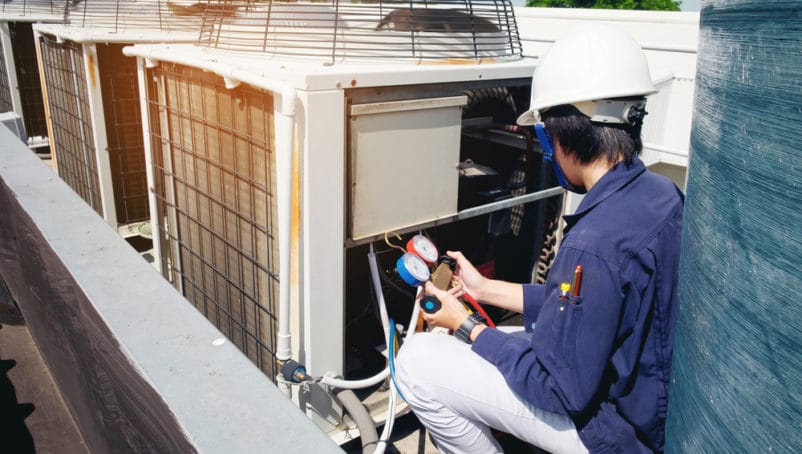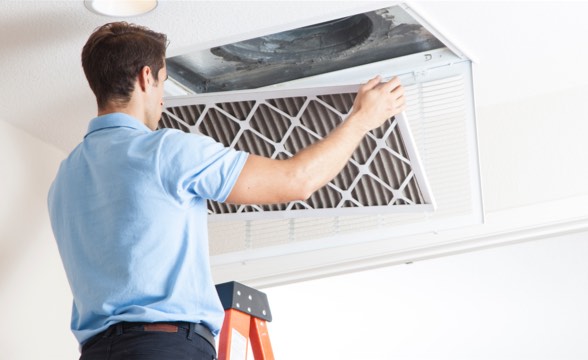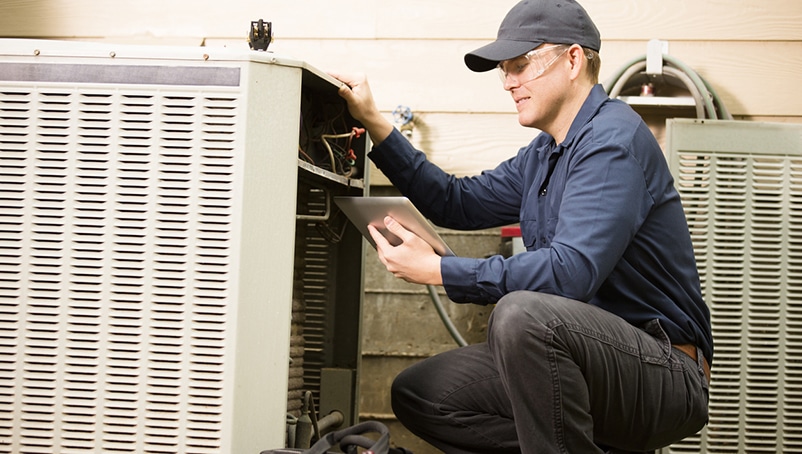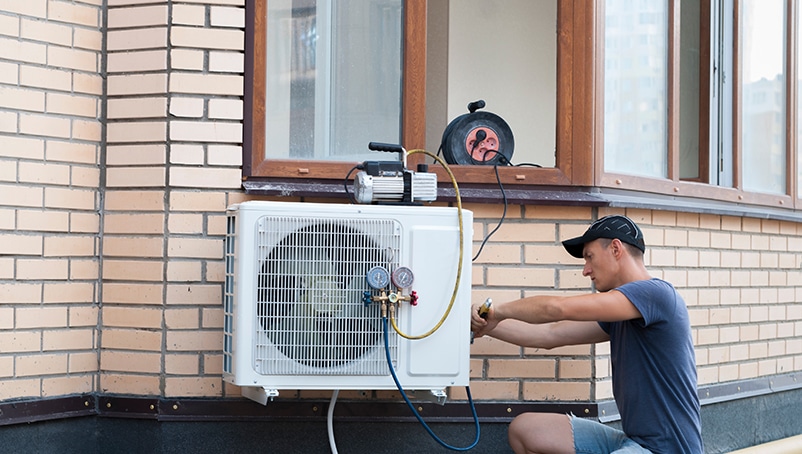Illinois
There is no licensing requirement on a state level in Illinois; however, there are HVAC license requirements on the local level. It is important to check the licensing requirements in the jurisdiction in which you plan to work.
Required business insurance in Illinois:
- Illinois requires workers’ compensation if you have any employees.
- If you drive for work-related tasks, you may need commercial auto coverage. Illinois’ minimum motor vehicle requirements are $25,000 per person / $50,000 per accident / $20,000 property damage.
Learn more about HVAC license and insurance requirements in Illinois.
Indiana
Indiana has no HVAC licensing requirements on the state level, but many local governments do have requirements. Make sure to check the requirements of the county or city in which you plan to work.
Required business insurance in Indiana:
- Indiana requires workers’ compensation if you have one or more employees.
- If you drive for work-related tasks, you may need commercial auto coverage. Indiana’s minimum motor vehicle requirements are $25,000 per person / $50,000 per accident / $25,000 property damage.
Iowa
The state of Iowa requires all levels of HVAC workers to be licensed. HVAC contractors must be licensed by the Iowa Department of Inspections, Appeals & Licensing.
To become a licensed contractor you must hold an HVAC master-level technician license or employ at least one person with that license. You must show a permanent place of business and proof of being properly insured with a $5,000 bond. You must also show proof of public liability insurance (also called general liability).
Required business insurance in Iowa:
- You must have a minimum coverage amount of $500,000 in general liability.
- Iowa requires workers’ compensation if you have one or more employees.
- If you drive for work-related tasks, you may need commercial auto coverage. Iowa’s minimum motor vehicle requirements are $20,000 per person / $40,000 per accident / $15,000 property damage.
Kansas
The state of Kansas does not require HVAC contractors to hold a license in order to work; however, there may be requirements on the local level, so it’s important to check with the local jurisdiction in which you plan to work.
Required business insurance in Kansas:
- Kansas requires workers’ compensation if a non-agricultural business’s gross annual payroll exceeds $20,000. All employees must be covered.
- If you drive for work-related tasks, you may need commercial auto coverage. Kansas’ minimum motor vehicle requirements are $20,000 per person / $40,000 per accident / $15,000 property damage.
Kentucky
HVAC contractors must be licensed by the Department of Housing, Buildings and Construction in order to work in Kentucky. To be eligible for a license, applicants must have held a valid Kentucky Journeyman Mechanic license for at least two years, and must have been under the direct supervision of a Master HVAC contractor.
You will need to pass a trade exam, as well as a business and law exam, and must have general liability insurance of at least $500,000. Eight hours of continuing education is required to renew the license.
Required business insurance in Kentucky:
- Contractors must have general liability in an amount not less than $500,000
- and property damage in an amount not less than $300,000.
- Kentucky requires workers’ compensation if you have one or more employees.
- If you drive for work-related tasks, you may need commercial auto coverage. Kentucky minimum motor vehicle requirements are $25,000 per person / $50,000 per accident / $25,000 property damage.
Learn more about HVAC license and insurance requirements in Kentucky.
Louisiana
In order to work in the state of Louisiana, HVAC contractors require a mechanical license from the Louisiana State Licensing Board for Contractors. A license is required for any project exceeding $10,000 in value, including labor and materials.
You will need to pass a trade exam and a business and law exam. You also must provide proof of experience in the form of an apprenticeship or through classroom education.
Required business insurance in Louisiana:
- Louisiana requires workers’ compensation if you have one or more employees.
- If you drive for work-related tasks, you may need commercial auto coverage. Louisiana minimum motor vehicle requirements are $15,000 per person / $30,000 per accident / $25,000 property damage.
Learn more about HVAC license and insurance requirements in Louisiana.
Maine
There are no HVAC contractor licensing requirements at the state level in Maine; however, it is important to check the local requirements before you begin any work.
Required business insurance in Maine:
- Maine requires workers’ compensation if you have any employees.
- If you drive for work-related tasks, you may need commercial auto coverage. Maine’s minimum motor vehicle requirements are $50,000 per person / $100,000 per accident / $25,000 property damage.
Maryland
HVAC contractors are required to be licensed by the Department of Labor, Licensing and Regulation, Board of Heating, Ventilation, Air Conditioning and Refrigeration Contractors, in the state of Maryland. There are three different licenses: Master HVACR Contractor, Master Restricted HAVCR Contractor and Limited HVACR Contractor.
All licenses require passing an exam. To qualify to take the exam, you will need to have the following:
- Master license: Be licensed as a Journeyman HVAC technician and provide all areas of HVACR services for three years working under the supervision of a licensed Master HVAC Contractor. You must have worked a minimum of 1,875 hours in the year before applying for the license.
- Master restricted license: Be licensed as a Journeyman HVAC technician and provide HVACR services for three years working under the supervision of a licensed Master HVAC Contractor. You must have worked a minimum of 1,875 hours in the year before applying for the license.
- Limited license: Be licensed as a Journeyman HVAC technician and provide HVACR services for two years working under the supervision of a licensed Master HVAC Contractor. You must have worked a minimum of 1,000 hours in the year before applying for the license.
You must show proof of business insurance in Maryland, including general liability insurance and property damage insurance.
Required business insurance in Maryland:
- You must have general liability insurance coverage for at least $300,000 and property damage liability insurance coverage for at least $100,000.
- Maryland requires workers’ compensation if you have one or more employees.
- If you drive for work-related tasks, you may need commercial auto coverage. Maryland minimum motor vehicle requirements are $30,000 per person / $60,000 per accident / $15,000 property damage.
Learn more about HVAC license and insurance requirements in Maryland.
Massachusetts
A general HVAC contractor in Massachusetts does not need a state license unless they work specifically in refrigeration. Any refrigeration contractor who works with more than 10 tons of refrigeration must be licensed.
To become licensed, you will need to pass an exam and show that you have had at least 2,000 hours of work experience as a licensed refrigeration technician. Educational experience is required as well, with coursework requirements starting at 250 hours depending on the total number of work hours completed.
Required business insurance in Massachusetts:
- Massachusetts requires workers’ compensation if you have any employees.
- If you drive for work-related tasks, you may need commercial auto coverage. Massachusetts’s minimum motor vehicle requirements are $20,000 per person / $40,000 per accident / $5,000 property damage.
Learn more about HVAC license and insurance requirements in Massachusetts.
Michigan
To work as an HVAC contractor in the state of Michigan, you will need to be licensed as a mechanical contractor by the Michigan Department of Licensing and Regulatory Affairs. The licensing is very specialized and you’ll need to choose from the ten classifications you want to work in. There are also specialty licenses.
You will need to pass an exam and must show at least three years of experience in every work classification if you want to receive a license.
Required business insurance in Michigan:
- Michigan requires workers’ compensation if you have one or more full-time employees, or three or more employees of any status.
- If you drive for work-related tasks, you may need commercial auto coverage. Michigan’s minimum motor vehicle requirements are $50,000 per person / $100,000 per accident / $10,000 property damage in another state.
Minnesota
While there are no state licensing requirements for HVAC contractors in Minnesota (as mechanical contractors), businesses have to file a $25,000 surety bond with the Department of Labor and Industry to perform gas, heating, ventilation, cooling, air conditioning, fuel burning or refrigeration work. There may be local licensing requirements for HVAC technicians.
Required business insurance in Minnesota:
- Minnesota requires workers’ compensation if you have any employees.
- If you drive for work-related tasks, you may need commercial auto coverage. Minnesota’s minimum motor vehicle requirements are $30,000 per person / $60,000 per accident / $10,000 property damage.
Learn more about HVAC license and insurance requirements in Minnesota.
Mississippi
HVAC contractors in the state of Mississippi require a license from the Mississippi State Board of Contractors if they work on projects over $10,000. Projects under $10,000 do not require a statewide license, but may be required for local jurisdictions. However, anyone who handles refrigerant must have an EPA certification. Also, the Board requires licensing for commercial and residential projects over $50,000.
To work on larger commercial jobs, Mississippi requires HVAC workers to have a mechanical contractor license. This classification has 16 specialty classifications. To get this license, applicants must pass a trade exam, as well as a law and business management exam.
In addition, you will need to show details of any HVAC experience, show proof of general liability insurance and workers’ compensation insurance (if the applicant has five or more employees), and submit a financial statement.
Required business insurance in Mississippi:
- Mississippi requires workers’ compensation if you have five or more employees.
- If you drive for work-related tasks, you may need commercial auto coverage. Mississippi minimum motor vehicle requirements are $25,000 per person / $50,000 per accident / $25,000 property damage.










